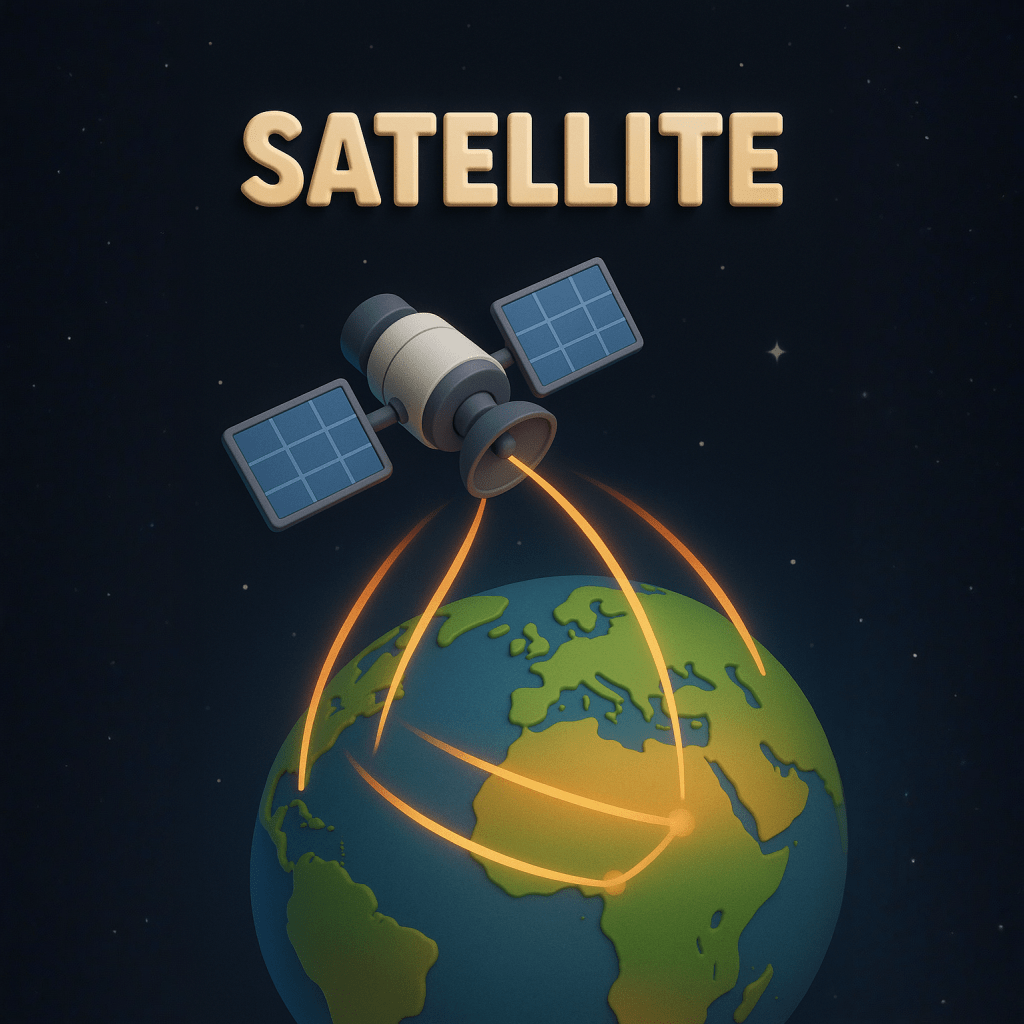Satellite
Definition
The term "satellite" describes a celestial body orbiting a planet, or an artificial object placed in orbit around the Earth or another planet for communication, observation, or other purposes.
Parts of Speech
- Noun
Pronunciation
American English
- IPA Pronunciation: /ˈsæ.təˌlaɪt/
- Respelling: SAT-uh-lyte
British English
- IPA Pronunciation: /ˈsæ.tə.laɪt/
- Respelling: SAT-uh-lyte
Etymology
The word "satellite" originates from the Latin "satelles," meaning "attendant" or "companion." It was first used in the 16th century to describe attendants of a noble or ruler, and later extended in the 17th century to refer to celestial bodies orbiting planets.
Derivatives
- Satellitic (adjective)
- Satellite-like (adjective)
- Satellite-based (adjective)
- Satellite system (noun)
- Unsatellite (adjective, rare)
Synonyms
- Orbiter
- Spacecraft
- Moon
Antonyms
- None
Usage
The term "satellite" is widely used in astronomy, telecommunications, and geopolitics. For example, "The Moon is a natural satellite of the Earth" or "The television signal is transmitted via a satellite."
Related Terms
- Orbit: The curved path of a celestial object or spacecraft around a star, planet, or moon.
- Spacecraft: A vehicle designed for travel or operation in outer space.
- Geostationary: A satellite orbiting Earth at a fixed position relative to the surface.
Detailed Definitions
Noun
- A celestial body orbiting a planet: Refers to natural satellites like the Moon.
- Example: "Jupiter has numerous satellites, including Europa and Ganymede."
- An artificial object placed in orbit: Refers to human-made objects used for communication, weather forecasting, navigation, and scientific research.
- Example: "The communications satellite relays signals across continents."
- A dependent or subordinate entity: Refers to a smaller state or organization under the influence of a larger one.
- Example: "The country became a satellite state of the dominant power."
satellite



🇨🇳 Mandarin
- 卫星 (satellite in general)
- IPA: /wèiɕíŋ/
- English respelling: way-sheeng
- 人造卫星 (man-made satellite)
- IPA: /rɛnzào wèiɕíŋ/
- English respelling: ren-zao way-sheeng
🇮🇳 Hindi
- उपग्रह (satellite in general)
- IPA: /upɐgraɦ/
- English respelling: up-gruh
- कृत्रिम उपग्रह (man-made satellite)
- IPA: /kɹɪtrɪm upɐgraɦ/
- English respelling: kritrim up-gruh
🇪🇸 Spanish
- Satélite (satellite in general)
- IPA: /sateˈlite/
- English respelling: sa-teh-lee-teh
- Satélite artificial (man-made satellite)
- IPA: /sateˈlite aɾtifisjal/
- English respelling: sa-teh-lee-teh ar-ti-fi-syal
🇫🇷 French
- Satellite (satellite in general)
- IPA: /satelit/
- English respelling: sah-teh-leet
- Satellite artificiel (man-made satellite)
- IPA: /satelit aʁtifiˈsjɛl/
- English respelling: sah-teh-leet ar-ti-fee-syel
🇸🇦 Arabic (Modern Standard)
- القمر الصناعي (satellite in general)
- IPA: /alqamr aṣṣināʕī/
- English respelling: al-qamr assi-na-e
- القمر الصناعي الاصطناعي (man-made satellite)
- IPA: /alqamr aṣṣināʕī al-ʔiṣṭināʕī/
- English respelling: al-qamr assi-na-e al-is-ti-na-e
🇧🇩 Bengali
- উপগ্রহ (satellite in general)
- IPA: /upɔgrɔɦ/
- English respelling: u-po-groh
- কৃত্রিম উপগ্রহ (man-made satellite)
- IPA: /kriːtrim upɔgrɔɦ/
- English respelling: kri-trim u-po-groh
🇷🇺 Russian
- Спутник (satellite in general)
- IPA: /ˈsputnʲɪk/
- English respelling: sput-nik
- Искусственный спутник (man-made satellite)
- IPA: /ɪskʊˈstvʲenːɪj ˈsputnʲɪk/
- English respelling: is-kust-ven-ny sput-nik
🇵🇹 Portuguese
- Satélite (satellite in general)
- IPA: /sɐˈtɛlitɨ/
- English respelling: sa-teh-lee-teh
- Satélite artificial (man-made satellite)
- IPA: /sɐˈtɛlitɨ ɐʁtifisjɐl/
- English respelling: sa-teh-lee-teh ar-ti-fi-syal
🇮🇩 Indonesian
- Satelit (satellite in general)
- IPA: /satelit/
- English respelling: sa-te-leet
- Satelit buatan (man-made satellite)
- IPA: /satelit buatan/
- English respelling: sa-te-leet bua-tan
🇩🇪 German
- Satellit (satellite in general)
- IPA: /zatɛˈlit/
- English respelling: zah-teh-lit
- Künstlicher Satellit (man-made satellite)
- IPA: /ˈkʏnstlɪçɐ zatɛˈlit/
- English respelling: kuens-tli-cher zah-teh-lit
🇯🇵 Japanese
- 衛星 (satellite in general)
- IPA: /eːseː/
- English respelling: eh-seh
- 人工衛星 (man-made satellite)
- IPA: /d͡ʑiŋkoːeːseː/
- English respelling: jin-ko-eh-seh
🇻🇳 Vietnamese
- Vệ tinh (satellite in general)
- IPA: /vɛ˧ˀ˦ tiɲ˧ˀ˦/
- English respelling: ve tinh
- Vệ tinh nhân tạo (man-made satellite)
- IPA: /vɛ˧ˀ˦ tiɲ˧ˀ˦ ɲaːn˦ˀ˥ taːw˧˥/
- English respelling: ve tinh nyan tao
🇰🇷 Korean
- 위성 (satellite in general)
- IPA: /wiːsʌŋ/
- English respelling: wee-sung
- 인공 위성 (man-made satellite)
- IPA: /inˈgoʊ̯ŋ wiːsʌŋ/
- English respelling: in-gong wee-sung
🇹🇷 Turkish
- Uydu (satellite in general)
- IPA: /ujdu/
- English respelling: uydoo
- Yapay uydu (man-made satellite)
- IPA: /japaj ujdu/
- English respelling: yap-ay uydoo
🇵🇰 Urdu
- سیٹیلائٹ (satellite in general)
- IPA: /seːʈiːlaɪʈ/
- English respelling: say-tee-layt
- مصنوعی سیٹیلائٹ (man-made satellite)
- IPA: /masˈnuːʔiː seːʈiːlaɪʈ/
- English respelling: mas-noo-ee say-tee-layt





